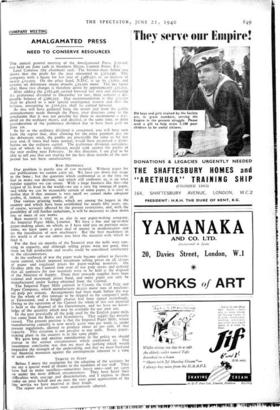COMPANY MEETING
AMALGAMATED PRESS
NEED TO CONSERVE RESOURCES THE annual general meeting of the Amalgamated Press, Limited, was held on June 14th at Southern House, Cannon Street, E.C. Lord Camrose (the chairman) said: The balance-sheet before you shows that the profit for the year amounted to £503,246. This compares with a figure for last year of £488,357, or an increase of nearly £15,000. On the other hand, N.D.C. is up by £3,800. and interest on debenture stocks absorbs £22,000 more. The net figure after these two charges is therefore down by approximately f, mom
After adding the £183,426 carried forward last year and deducting the preference dividend to December 1st last, there remains a dis- posable balance of £266,355. Our recommendation is that £5.o.000 shall be placed to a new special contingency reserve and that the balance, amounting to £216,355, shall be carried forward. As you will have gathered from the report and from the public announcement made through the Press, your directors came to the conclusion that it was not possible for them to recommend a divi- dend on the ordinary shares, and decided, at the same time, to defer consideration of the preference dividend due to have been paid on June 1st.
So far as the ordinary dividend is concerned, you will have seen from the report that, after allowing for the extra payment due on the debenture stock, the profits are practically the same as for last year and, if times had been normal, would have permitted a distri- bution on the ordinary capital. The preference dividend, considera- tion of which we have deferred, would rank against the profits of the year ending next February. In this direction, I am glad to be able to tell you that our trading for the first three months of the new period has not been unsatisfactory.
RAW MATERIALS
Our problem is purely one of raw material. Without paper for our publications we cannot carry on. We have cut down our usage to the bone ; but the question which confronted us at the time we had to make our decision, and which still confronts us, is on what regular supplies we can count. With a large business like this—the Ingest of its kind in the world—we use a very big tonnage of paper, and while we can be reasonably certain of some paper, it is easy to realise that if that amount is very small we cannot make adequate profits, if, indeed, any profits at all.
Our various printing works, which are among the largest in the country and which have been established for nearly fifty years, are, of course, seriously affected by the present restrictions, and, with the possibility of still further reductions, it will be necessary to close down one or more of our works.
Raw material is vital to us also in our paper-making company, the Imperial Paper Mills, Limited. We have a fine and up-to-date paper-making plant, on which, as I have told you on previous occa- sions, we have spent a great deal of money in modernisation and on the installation of new machinery. But the best machinery in the world is of no use unless you have the material with which to feed it.
For the first six months of the financial year the mills were run- ning to capacity, and although selling prices were not good, they were on full production and results could be considered satisfactory in the circumstances.
At the outbreak of war the paper trade became subject to Govern- ment control, which imposed maximum selling prices on all classes of paper and regulated prices for paper-making materials. On October 28th the Control took over all our pulp stocks and ordered that all contracts for raw materials were to be held at the disposal of the Minister of Supply. From then onwards supplies have been rational and maximum prices fixed, and today paper can only be manufactured under licence obtained from the Control.
The Imperial Paper Mills controls in Canada the Gulf Pulp and Paper Company, which manufactures 6o,000 moist tons of mechani- cal pulp per annum. Arrangements had been made before the war for the whole of this tonnage to be shipped to the company's mills at Gravesend, and a freight charter had been signed accordingly. Owing to the operation of the Control the whole of this raw material is held at the disposal of the Government, and we have no know- ledge of the quantity which may be available for our own use.
In the past practically all the pulp used by the English paper mills has come from the Baltic and Scandinavia. That supply has entirely ceased. The present position is that the Imperial Paper Mills, whose manufacturing capacity is now nearly 4,000 tons per week, is, under Present regulations, allowed to produce about 20 per cent. of that capacity. This situation is not peculiar to our mills. Every paper- making plant in the country is in the same plight.
We gave- long and anxious consideration to the policy we should pursue in the serious circumstances which confronted us. Our unanimous conclusion was that we must du nothing which would jeopardise the strength of the undertaking, and that we must husband our financial resources against the contingencies inherent to a time of such crisis.
TRIBUTE TO STAFF
Before I move the resolution for the adoption of the accounts let me say a special word of thanks to the members of our staff. They have had to make sacrifices—sometimes heavy ones—and yet carry on under the most difficult circumstances. They have faced their difficulties with courage and determination, and I express to them today on your behalf and on ours the very great appreciation of the fine service we have received at their hands. The report and accounts were unanimously adopted.






























 Previous page
Previous page